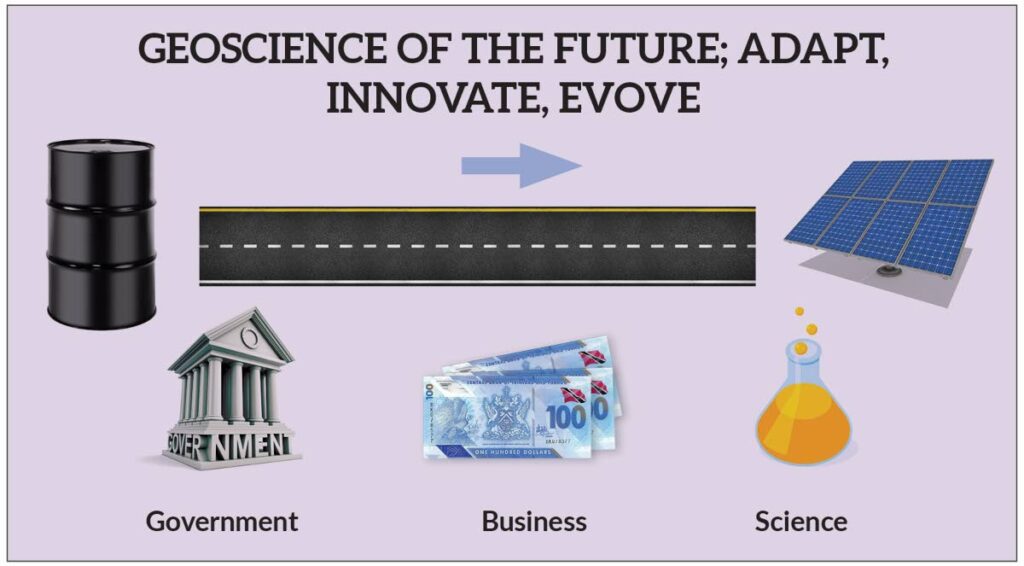July conference explores the future of geoscience

Courtesy the Geological Society of Trinidad and Tobago
The 7th Geological Conference with the theme – Geoscience of the Future: Adapt, Innovate, Evolve will be held in Trinidad from July 11-13. Four sub-themes will address the fast-moving developments in the areas of geoscience, the environment, natural resources and energy. Attendees will have the choice to attend one, two or three days virtually. The first day also has an in-person option at the Hyatt in Port of Spain, which will end with a cocktail and networking reception. After months of uncertainty due to covid, this hybrid approach was felt most appropriate.
The conference days will be preceded and proceeded by field trips and short courses, which span July 7-15. All four courses are virtual and cover: Tectonics of the Southern Caribbean, Fault Kinematics, Designing a Petroleum Reservoir Model and Sustainable Energy in small island states.
Five field trips (some virtual, some in-person) will take participants across Trinidad and Tobago. In Tobago, they will learn about the island’s geology and the impact on its water resources, geohazards and climate change. At the Palo Seco Bay of southern Trinidad, they will learn how our rich oil and gas reservoirs were formed. Another trip will take us across the Southern Basin along a 2D seismic line, through various oilfields and outcrops. There is one exclusively about mud volcanoes in TT, particularly Piparo and the Devil’s Woodyard. The last trip is a core workshop that will focus on samples from the Nariva River, Carli Bay and Erin delta.

The conference includes keynote speakers, parallel technical sessions, panel discussions, student poster sessions and round table discussions. Topics to be covered include: innovation in oil and gas technology, seismology, volcanology, coastal erosion, mining and aggregate resources, biostratigraphy, geophysics, renewable energy, business of petroleum, and geochemistry among others.
The target audience for this conference are geoscience practitioners, students of geoscience, geology, and geography, environmental and marine research institutes, regulatory agencies and stakeholders related to geoscience and the energy sector, which include but are not limited to drillers, reservoir and petroleum engineers.
This conference will also highlight the changing energy mix that has resulted from efforts to reduce carbon emissions. As a result, experts in alternative energy initiatives and climate change specialists will also be featured. Participants are provided with a forum to publish work either as a full paper or abstract (deadline is June 1), learn about new developments, network with other professionals (and potential future employers) and get noticed.
The four sub-themes of the conference will be tackled through the various panel discussions, technical papers and posters, short courses and field trips.
1. Core geoscience explores the fundamentals of earth science and its impact on daily life in the region. Volcanic eruptions, earthquakes and slope instability, mud volcanoes, quarries, hydrogeology, geotechnical engineering are some of the key topics.
2. The hydrocarbon industry – our biggest revenue earner and the heart of the geoscience operations in TT. Exploration and development updates, the business of petroleum, reservoir modelling, onshore and offshore projects, and mature field production will all be covered.
3. Geoscience and the environment: three areas will be explored – carbon sequestration and storage, geohazards and slope stability and coastal and marine research.
4. The future of geoscience: unconventional and alternate resources, changing the way we use data, pivoting from geoscientists into related careers and advances in geophysical and geological techniques underpin this theme.
The GSTT, founded in 1976, is an NGO whose mission is to build the technical and professional competency of its members and associates. The society’s objectives are to identify and promote the optimal usage of natural resources in a manner that is in accordance with acceptable environmental practices; sensitise the public on common geological phenomena and natural hazards; and collaborate with affiliated organisations on matters of common interest such as energy, natural hazards, and ground water. The GSTT holds a conference every five years and it is a cornerstone of the society’s mandate to increase the level of geoscience in the region, increase public awareness and provide student guidance. Other society activities include monthly technical talks, field trips, quarterly newsletter and short courses.
The conference committee is composed of over 30 professionals whose global careers span decades in various fields of geoscience in the public and private sectors. Several sponsors are already on board, including NGC, Heritage Petroleum, BP, Shell, EOG Resources, Atlantic, Schlumberger, Repsol, Baker Hughes, DeNovo Energy, CGG, ION Geophysical, Stratum Reservoir, Tucker Energy, Q-eye and Ramps Logistics.
Please join us in a conference that tests our current understanding and explores future opportunities in geoscience. Visit the conference site for a complete overview of all the 3-day sessions, field trips and courses and how to register, upload papers, posters and presentations.
Conference website: https://7thgsttconference.vfairs.com/en/

Comments
"July conference explores the future of geoscience"